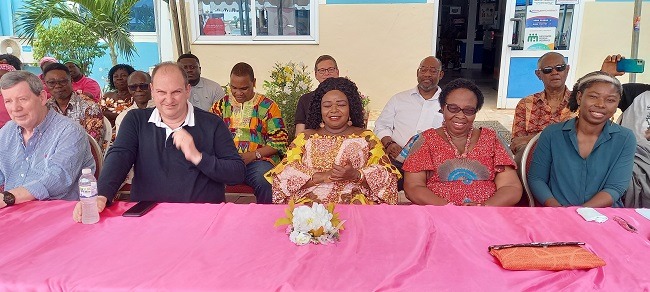Breast Care International discovers new technology to treat cancers

The President of Breast Care International (BCI), Dr. Mrs. Beatrice Wiafe Addai, has welcomed the discovery of new technology in treating cancers in Sub – Saharan Africa.
She said the new technology has complemented the efforts of Breast Care International and Peace love Hospitals in the fight against cancers in Ghana, especially breast cancer.
The new technology, known as ‘Tiny Drones to Deliver Cancer’, when applied, will eliminate the side effects in cancer treatment like the loss of hair among others, she added.
The new technology was invented by Prof Wilfred Ngwa, an American based Cameroonian lecturer at the John Hopkins University.
Dr. Mrs. Beatrice Wiafe Addai, who is also the CEO of Peace and Love Hospital, said this during a meeting with the Peace and Love Breast Cancer Survivors (PALSA) in Kumasi on Thursday, May 12, 2022.
The occasion was to introduce the survivors to the three Commissioners of Lancet Oncology, comprising Prof Wilfred Ngwa (USA), David Kerr from the Oxford University (UK) and Dr Beatrice Wiafe Addai from Ghana.
The visit was also to interact with survivors to access their situations after the launch of the Lancet Oncology Commission report in Accra on Tuesday, May 10, 2022.
The Lancet Oncology Commission report is to support the management, research, reporting, prevention, treatment and palliative care of cancer in Sub-Sahara Africa.
“Cancer patients in the Sub – Saharan Africa, especially Ghana, will no longer go through the vigorous treatment in cancer. The new technology when starts rolling in 2023, will complement the BCI’s efforts in the fight against breast cancer in the Ghana,” Dr Wiafe Addai said.
“Am glad that my PALSA was captured in the Lancet Oncology Commission report and we will corporate with any research in Africa that the report recommended,” the elated consultant surgeon added.
Professor Wilfred Ngwa, who also lectures at Harvard University, in an interview, hinted that clinical trials are starting at Harvard and John Universities in 2022 and follows it up in Ghana in 2023.
Prof Ngwa said most of the cancers reported in Africa are late; the cancer has spread to the parts of the body and the only option is to do surgery.
“With the new technology, that is ‘Tiny Drones to Deliver Cancer’, no matter where the cancer has spread to, will train the immune system and fight it, without any side effects like the chemo and radio therapies with loss of hair among others,” he assured.
‘Tiny Drones to Deliver Cancer’
A powerful new technology designed to kill cancer cells that have spread to other parts of the body. The technology combines microscopic nanoparticles with medicine—all packed into a tiny drone the size of a grain of rice.
The rice-size materials are routinely implanted in patients to guide radiotherapy treatment of cancers.
The smart technology, which is employed at no additional inconvenience to patients, once in place, the technology will proficiently release the microscopic particles/medicine to enhance local tumor cell death during radiotherapy and act as a beacon to call in the patient’s white blood cells.
The white blood cells are then trained to kill cancer cells and can patrol the entire body, fighting cancer that has spread with greater effectiveness.
Source: Otec fm





